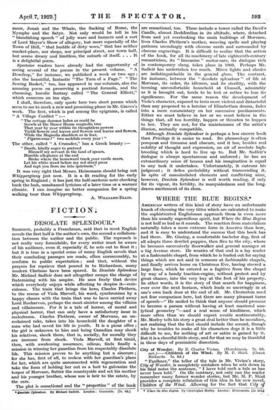FICTION;
DESOLATE SPLENDOUR.*
SOMEONE, probably a Frenchman, said that in most English novels the first half is the author's own, the second a collabora- tion between the author and the public. The reproach is not really very formidable, for every writer must be aware of his audience, even if, especially if, he sets out to flout it ; but it is true in a special sense of many English novels that their concluding passages are made, often unreasonably, to conform to public expectation ; and that, without the prayers for reprieve that poured in to Richardson, many modem Clarissas have been spared. In Desolate Splendour Mr. Michael Sadleir does not altogether escape the charge of fraternizing with his umpire. He uses freely that device which everybody enjoys while affecting to despise it—coin- cidence. The train that brings the hero, Charles Plethem, to the rescue of Viola Marvell, his ward, synchronizes by a happy chance with the train that was to have carried away Lord Rockarvon, perhaps the most sinister among the villains and villainesses. For it is a tale of horror, of moral and physical horror, that can only have a satisfactory issue in melodrama. Charles Plethem, owner of Morvane, an un- reclaimed rake, takes into his household the daughter of a man who had saved his life in youth. It is a pious office ; the girl is unknown to him and being Canadian may shock his relatives, shock them, that is, socially, for morally they are immune from shock. Viola Marvell, at first timid, then, with awakening assurance, odious, finds finally a mission in *inning her guardian from his respectably dissolute life. This mission proves to be anything but a sinecure ; for she has, first of all, to reckon with her guardian's plans for her, which are quite unconnected with regeneration and take the form of holding her Out as a bait to galvanize the torpor of Morvane, flutter the countryside and set his mother and his younger brother, whose son is heir to the estate, by the ears.
The plot is sensational and the " properties " of the book • ■Pszotass Spit/Wow% By Michael Badleir. London : Constable. r7s. 6c1.1
are sensational, too. These include a tower called the Devil's Candle, almost Beckfordian in its altitude, where, detached from and yet overlooking the main buildings of Morvane, lives Charles Plethern's mother, weaving spells and playing patience unendingly with obscene cards and surrounded by obscene engravings. It is difficult to realize that the action of the book, for all its machinery of late eighteenth-century romanticism, its " limousine " motor-cars, its dialogue rich in contemporary slang, takes place in 1903. Perhaps Mr. Sadleir has undertaken too much. Minor lights and shades are indistinguishable in the general glare. The contrast, for instance, between the "desolate splendour" of life at Morvane, its order, its idleness, and its sterility, with the teeming uncomfortable household at Clonsall, admirably as it is brought out, tends to be lost or rather to lose its significance. For the same reason the development of Viola's character, exposed to tests more violent and distasteful than any proposed to a heroine of Elizabethan drama, fades into a mere commentary on her successive predicaments. Either we must believe in her or we must believe in the things that, all too horribly, happen or threaten to happen to her. They are not, for the maintenance of the artist's illusion, mutually compatible.
Although Desolate Splendour is perhaps a less sincere book than Privilege it is easier to read. Its phraseology is often pompous and tiresome and obscure, and it has, besides real nobility of thought and expression, an air of resolute high- breeding which is hard to live up to. But Mr. Sadleir's dialogue is always spontaneous and unforced ; he has an extraordinary sense Of houses and his imagination is equal to any task it undertakes. Unfortunately, it outruns his judgment ; it defies probability without transcending it. In spite of unassimilated elements and conflicting aims, however, Desolate Splendour is well worth reading, if only for its vigour, its fertility, its manysidedness and the long. drawn excitement of its close.










































 Previous page
Previous page